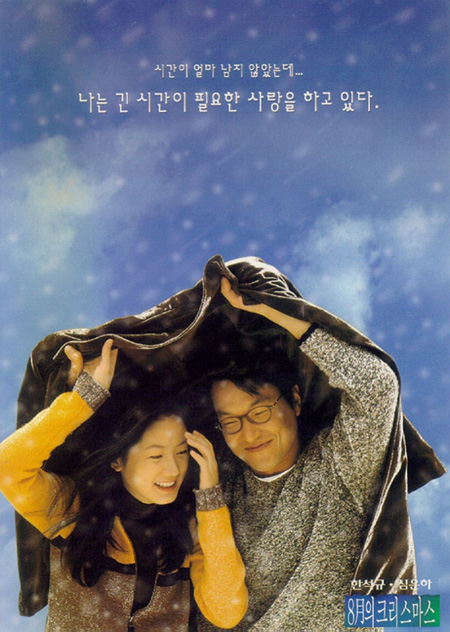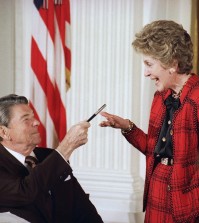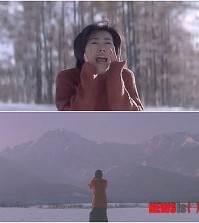- California Assembly OKs highest minimum wage in nation
- S. Korea unveils first graphic cigarette warnings
- US joins with South Korea, Japan in bid to deter North Korea
- LPGA golfer Chun In-gee finally back in action
- S. Korea won’t be top seed in final World Cup qualification round
- US men’s soccer misses 2nd straight Olympics
- US back on track in qualifying with 4-0 win over Guatemala
- High-intensity workout injuries spawn cottage industry
- CDC expands range of Zika mosquitoes into parts of Northeast
- Who knew? ‘The Walking Dead’ is helping families connect
Teen hype for bygone era

“Christmas in August,” which premiered in 1998, was rereleased on Nov. 7 in tune with the retro trend in Korea. (Courtesy of Sidus Pictures)
By Kwon Ji-youn, Park Jin-hai, Yoon Sung-won
A new cell phone is released every few months and updates to software and applications are made available on a weekly basis.
Blogs and reviews are posted daily, and news reports are covered in the space of seconds.
Most open a new window on their computer before looking outside in the morning, and answer emails and text messages on their smartphones before their mothers’ calls for breakfast.
And rightly so.
In such a fast-paced city, one needs to be extremely diligent to keep up ― dawdle for one moment and you fall more than a few steps behind.
And so to cater to the needs of such an active generation desperate for a breather, content has, ironically, slowed way down.
In Korea, film distributors are rereleasing old-generation movies and broadcasters are taking their audiences back to the 1990s.
“In such an orderly and digitalized society, there is an increasing demand for the slower-paced culture of the ‘90s,” said Park Ji-yeong, a local film marketer. “People want to relive the ‘analog’ generation, and to satisfy those needs we decided to rerelease films like ‘Christmas in August.’ Such films are set in the ‘90s but are far from tacky.”
Other films, such as the 1980 film “La Boum” and 1999 film “Love Letter,” will premiere once more. Films such as “Jurassic Park,” whose original version was released in 1993, have been reproduced in 3D.
Dramas such as “Reply 1994” are also gaining popularity.
“The main characters in ‘Reply 1994’ are about my age,” said 33-year-old school teacher Kim Joung-sun. “Details, including incidents, stage props and situations, remind me of when I was younger. I’m able to reminisce.”
“Watching ‘Reply 1994,’ I remember the days when we would record songs from the radio onto cassette tapes and listen to them on Sony’s Walkman, because CD players were too expensive,” added Lee Yong-kwon, 29. “We would wait in lines at public phones to listen to messages on our beepers, and send number messages to each other in code.”
Lee recalled how they would collect posters of celebrities and rip out pages from magazines to prove how great a fan they were.
“Today, there exist countless idol groups ― with more than 10 members each ― and they sing songs with lyrics I can barely understand,” he continued. “Dramas like ‘Reply 1994’ take us back to when all that didn’t exist.”
Retro-craze
As a matter of fact, content set in the 1990s actually are a hit. The 2011 film “Sunny” and the 2012 film “Architecture 101” are thought to have triggered the craze, and this phenomenon is still going strong.
Most critics agree that this craze, made more evident with the popularity of such films, is actually a continuing trend.
Even before the recent popularity of content depicting the past two or three decades, historical dramas have received unwavering attention, despite the fact that no viewer is able to identify with the characters. Viewers wonder about the lives of heroes and heroines of so long ago.
“Also, there were many dramas set in the 1960s and 70s, but considering that our consumer base is in their 20s or 30s, there was a major shortage in content suitable for them,” said An Mi-hyun, a senior specialist in public relations at CJ E&M, the production company of “Reply 1994.” “We call this the ‘young retro.’”
The production crew wanted to bring back the ‘90s. The producer was intrigued by the 1990s music scene and fandom, An said.
“Both the writer and producer entered college in 1994,” she continued. “They remember a lot of how things were back then.”
Culture critic Jung Mi-rae attributes such success to time travel.
“Most dramas focused on depicting the luxurious lives of the rich and powerful, or the young and trendy,” she said. “Though ‘Reply 1994’ is a little rustic, it is affectionate and warm.”
She added that centering on the theme of young love among those just out of their teens also helps viewers identify with the plotline.
Teens replying to 1994
Evidently, those in their 30s and 40s watch such dramas to travel back in time. But according to a recent AGB Nielson Media Research poll, viewer ratings were highest among teens and those in their 30s.
Lee So-yeon, a 17-year-old student, admitted that it is difficult to identify with some of the situations in “Reply 1994.”
“Most of the characters are not from Seoul, and use regional dialects,” she said. “And though we have heard a lot about beepers and Seo Taiji, we haven’t experienced them directly.”
But Lee said curiosity is what drives her to continue watching the drama.
“Most of my friends are originally from Seoul, so I find myself attracted to those using regional vernacular,” she said. “It’s new.”
Han Lee-chae, 20, is drawn to the fan culture of the 1990s that is depicted throughout the soap.
“I feel a sense of connectedness and fellowship with the characters because I can identify with the admiration they feel for celebrities,” he said. “I’m interested in the idols and the music of the 1990s.”
CJ E&M’s An said that teens are inquisitive about what life was like in the 1990s.
“Our drama is programmed on weekends when the entire family can gather to watch TV,” she said. “Teens who don’t know Seo Taiji ask their parents about him, and their parents are able to tell them about their idols.”
An added that such dramas link the past with the present. It bridges the intergenerational gap that parents and children may feel.
“And it helps that ‘Reply 1994’ is not about the political and economic difficulties our country experienced during that time,” added Jung. “It’s about the life of the average college student.”
Will ‘memory-selling’ sustain?
Critics seem to have similar views about the sustainability of such retro content. They agree that this is a marketing strategy that is based on memories.
As time goes by, new memories will form. With new memories, new stories can be told to those of generations later. Just as it is difficult to settle on when retro began, it is far more difficult to speculate when retro will end.












![일본 사도광산 [서경덕 교수 제공. 재판매 및 DB 금지]](http://www.koreatimesus.com/wp-content/uploads/2024/07/PYH2024072610800050400_P4-copy-120x134.jpg)


